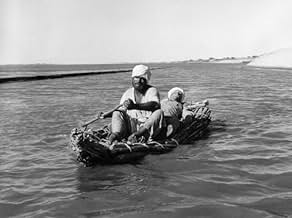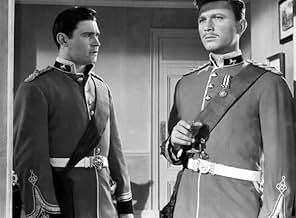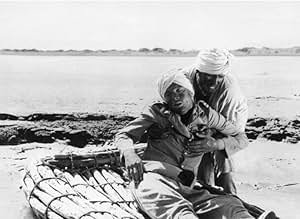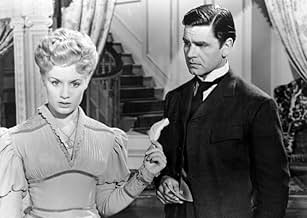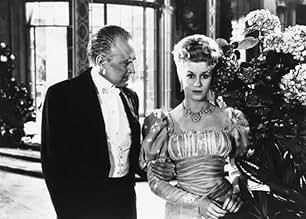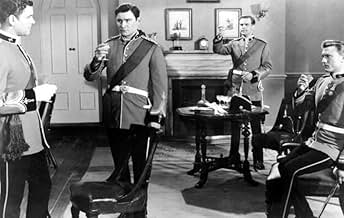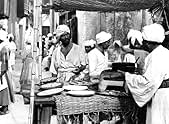अपनी भाषा में प्लॉट जोड़ेंA British officer resigns his commission on the eve of his regiment's departure for war in Sudan. Accused of cowardice by his friends and the woman he loves, he sets out to prove his courage... सभी पढ़ेंA British officer resigns his commission on the eve of his regiment's departure for war in Sudan. Accused of cowardice by his friends and the woman he loves, he sets out to prove his courage to them. A remake of "The Four Feathers" (1939).A British officer resigns his commission on the eve of his regiment's departure for war in Sudan. Accused of cowardice by his friends and the woman he loves, he sets out to prove his courage to them. A remake of "The Four Feathers" (1939).
फ़ीचर्ड समीक्षाएं
If the name The Sudan is familiar today it is probably on account of the constant references to the exploits of his youth by Jonesy in 'Dad's Army' of the time he spent engaging the Mad Mahdi, briefly seen played by John Laurie in footage from the 1939 version.
Here you get a chance to see the thing played straight in this CinemaScope remake by Zoltan Korda of his classic thirties Ripping Yarn back in the days when Britain still had an empire.
Anthony Steel is a colourless substitute for John Clements as Harry Faversham and the less said about Lawrence Harvey in the role originally played by Ralph Richardson the better; but the late Mary Ure makes a charming and gracious heroine, while Osmond Borradaile's original location footage continued to give good value in this and a subsequent seventies version.
Here you get a chance to see the thing played straight in this CinemaScope remake by Zoltan Korda of his classic thirties Ripping Yarn back in the days when Britain still had an empire.
Anthony Steel is a colourless substitute for John Clements as Harry Faversham and the less said about Lawrence Harvey in the role originally played by Ralph Richardson the better; but the late Mary Ure makes a charming and gracious heroine, while Osmond Borradaile's original location footage continued to give good value in this and a subsequent seventies version.
One Sunday afternoon in 1982 BBC 1 broadcast STORM OVER THE NILE . Nothing remarkable in itself with this scheduling but later that evening the ITV channel broadcast THE FOUR FEATHERS remake from the late 1970s ! Two different versions of the same story broadcast a few hours within each other on the two network channels ! Amazing , and not something that was unnoticed since myself and several school colleagues remarked upon this the next day . We were all in unanimous agreement that STORM OVER THE NILE was the much superior movie . Strangely over the years every time Terence Young's version is broadcast the TV guides don't have kind words for the 1955 film version of AEW Mason's story and after seeing the original 1939 version of THE FOUR FEATHERS I understand why - It's a rip off !
In the past I have criticised movies like CRITICAL MASS and RANGERS that use extensive film footage from other movies like TERMINATOR 2 and NAVY SEALS . With STORM we see the exact same thing . The truly great battle scenes weren't directed by Young they were directed by Zoltan Korda almost 20 years earlier . To be fair I don't think the producers are claiming that this is an entirely original movie hence the credit for both Korda and Young in the directors slot but I did see the 1939 version a week earlier on channel 4 and this spoils the enjoyment of STORM since the script is identical as are most of the action scenes . If you've never seen the original you'll like this movie but if you remember the unforgettable 1939 version by the Korda brothers you'll be left with a cynical feeling watching this
In the past I have criticised movies like CRITICAL MASS and RANGERS that use extensive film footage from other movies like TERMINATOR 2 and NAVY SEALS . With STORM we see the exact same thing . The truly great battle scenes weren't directed by Young they were directed by Zoltan Korda almost 20 years earlier . To be fair I don't think the producers are claiming that this is an entirely original movie hence the credit for both Korda and Young in the directors slot but I did see the 1939 version a week earlier on channel 4 and this spoils the enjoyment of STORM since the script is identical as are most of the action scenes . If you've never seen the original you'll like this movie but if you remember the unforgettable 1939 version by the Korda brothers you'll be left with a cynical feeling watching this
If you're going to clone something in Hollywood, clone something good which is what Storm Over The Nile is. It is yet another remake of the famous novel The Four Feathers. The same treatment was afforded Dawn Patrol by Warner Brothers back in the Thirties when the first version with Douglas Fairbanks, Jr. was cloned into the second with Errol Flynn.
The script from the classic British production from 1939 was used as well as all the battle sequences. That was a wise thing because in 1939 the British controlled the Sudan and were able to film their action sequences on the very spot where these things occurred back in the late 19th century. Not to mention that it certainly saved big time on the budget.
Anthony Steel plays our protagonist Harry Fevasham who questions his own courage when he's about to be shipped into action in the Sudan. Steel is from a military family and there are reasons of tradition and obligations that force him into that life. His brother officers brand him a coward and send him a white feather as the symbol of same.
Some time later Steel goes to the Sudan and lives as an Arab tribesman and in that role performs some truly heroic feats. Best as always is his saving Laurence Harvey who is one of his accusers who is now blind as a result of prolonged exposure to the desert sun. Harvey's role was done in 1939 by Ralph Richardson.
James Robertson Justice is also in the cast playing a really good John Bull type character. He's the father of Mary Ure who was supposed to marry Steel before his resignation and the feathers. JRJ always adds a lot to any film he's ever in.
The Four Feathers with its story about a man questioning his courage and finding out truly if he has the right stuff is in the British culture very much akin to The Red Badge Of Courage. That has only had one film adaption whereas The Four Feathers has had many. Beau Bridges did one in the Seventies and the late Heath Ledger starred as Harry Fevasham in the latest screen version.
But only the 1939 and 1955 can boast actual on scene location shooting. And unless the Sudan changes radically were not likely to see another.
The script from the classic British production from 1939 was used as well as all the battle sequences. That was a wise thing because in 1939 the British controlled the Sudan and were able to film their action sequences on the very spot where these things occurred back in the late 19th century. Not to mention that it certainly saved big time on the budget.
Anthony Steel plays our protagonist Harry Fevasham who questions his own courage when he's about to be shipped into action in the Sudan. Steel is from a military family and there are reasons of tradition and obligations that force him into that life. His brother officers brand him a coward and send him a white feather as the symbol of same.
Some time later Steel goes to the Sudan and lives as an Arab tribesman and in that role performs some truly heroic feats. Best as always is his saving Laurence Harvey who is one of his accusers who is now blind as a result of prolonged exposure to the desert sun. Harvey's role was done in 1939 by Ralph Richardson.
James Robertson Justice is also in the cast playing a really good John Bull type character. He's the father of Mary Ure who was supposed to marry Steel before his resignation and the feathers. JRJ always adds a lot to any film he's ever in.
The Four Feathers with its story about a man questioning his courage and finding out truly if he has the right stuff is in the British culture very much akin to The Red Badge Of Courage. That has only had one film adaption whereas The Four Feathers has had many. Beau Bridges did one in the Seventies and the late Heath Ledger starred as Harry Fevasham in the latest screen version.
But only the 1939 and 1955 can boast actual on scene location shooting. And unless the Sudan changes radically were not likely to see another.
Sweeping new adaptation plenty of idealism ,heroism , friendship , redemption and overwhelming battles. It's a great classical movie of the British imperialism adventure , a genuine ripping yarn picking up several stunning images and with some stirring action taken from the quite better 1939 version . This fifth rendition about known story by A. E. W. Mason concerns a British young officer named Harry Faversham (Anthony Steel). Resigning from Army , he's rejected by his father-in-law (James Robertson Justice) and his engaged fiancée (Mary Ure), branded a coward and sent four white feathers by his friends (Ronald Lewis, Laurence Harvey, Ian Carmichael) . Determined to save his honor he heads to Sudan campaign against Derviches who previously (thirteen years before) had murdered General Gordon in Karthoum. There arrives the expedition of help commanded by General Wolsey and Kitchener for stifle the rebellious Sudan's tribes ruled by 'the Madhdi' , the ¨expected one¨ (events developed in ¨Khartoum¨ film -1966- with Charlton Heston and Laurence Olivier , directed by Basil Dearden) . The Madhi along with Arab tribes had besieged Khartoum (1884) and vanquished General Gordon . Faversham disguised himself as a native will save his friends from certain death and he will retrieve the lost honors .
This is a spectacular adventure detailing the epic feats of a brave hero, containing noisy action, idealism , romance , unlimited courage , breathtaking battles and impressive landscapes . It's a typically polished British and packs real enthusiasm of the imperialist arrogance along with standard heroic issues . Anthony Steel as stubborn officer is fine , Laurence Harvey as his best friend is convincingly played and Mary Ure as his girlfriend is enjoyable . Special mention for James Roberson Justice as swagger general Burroughs . Solid performances all around and excellent plethora of secondaries as Christopher Lee , Ferdy Mayne , Michael Hordern , Geoffrey Keen , among them . Sensational battle scenes staged by means of thousands of extras , though partially taken from former film directed by Zoltan Korda . Evocative cinematography in superb Technicolor camera-work , showing the late 1800's and sunny African landscapes by two cameramen : Edward Scaife and Osmond Borradaille for exterior photography in Sudan and interior filmed in Shepperton studios . Rousing and impressive musical score by Benjamin Frankel . The motion picture was professionally directed by Zoltan Korda and Terence Young with imagination and fair-play enough .
Other adaptations about this famous story are the following ones : the old and silent renditions filmed in 1915 , 1921 , and 1929 directed by Ernest B. Schoedsack and Merian C. Cooper with Richard Arlen, Fay Wray and Clive Brook ; the classic rendition by Zoltan Korda (1939) with John Clemens , Ralph Richardson and Jane Duprez ; and for TV (1978) by Don Sharp with Beau Bridges , Jane Seymour , Robert Powell and eventually , a modern rendition with Heath Ledger , Kate Hudson , Wes Bentley , and Michael Sheen .
This is a spectacular adventure detailing the epic feats of a brave hero, containing noisy action, idealism , romance , unlimited courage , breathtaking battles and impressive landscapes . It's a typically polished British and packs real enthusiasm of the imperialist arrogance along with standard heroic issues . Anthony Steel as stubborn officer is fine , Laurence Harvey as his best friend is convincingly played and Mary Ure as his girlfriend is enjoyable . Special mention for James Roberson Justice as swagger general Burroughs . Solid performances all around and excellent plethora of secondaries as Christopher Lee , Ferdy Mayne , Michael Hordern , Geoffrey Keen , among them . Sensational battle scenes staged by means of thousands of extras , though partially taken from former film directed by Zoltan Korda . Evocative cinematography in superb Technicolor camera-work , showing the late 1800's and sunny African landscapes by two cameramen : Edward Scaife and Osmond Borradaille for exterior photography in Sudan and interior filmed in Shepperton studios . Rousing and impressive musical score by Benjamin Frankel . The motion picture was professionally directed by Zoltan Korda and Terence Young with imagination and fair-play enough .
Other adaptations about this famous story are the following ones : the old and silent renditions filmed in 1915 , 1921 , and 1929 directed by Ernest B. Schoedsack and Merian C. Cooper with Richard Arlen, Fay Wray and Clive Brook ; the classic rendition by Zoltan Korda (1939) with John Clemens , Ralph Richardson and Jane Duprez ; and for TV (1978) by Don Sharp with Beau Bridges , Jane Seymour , Robert Powell and eventually , a modern rendition with Heath Ledger , Kate Hudson , Wes Bentley , and Michael Sheen .
Being something of a pacifist, Harry Faversham (Anthony Steele) has the misfortune to be born into a staunchly military family with all the expectations of an overbearing father (Michael Hordern) weighing down on his shoulders. Harry toes the line to please his dad, but when the old boy pops his clogs, he swiftly resigns his commission. As a consequence, he receives a white feather (the symbol of cowardice) from each of his best friends (Laurence Harvey, Ronald Lewis, and an out-of-place Ian Carmichael) on the eve of their departure to war in the Sudan. Harry awards himself a symbolic feather on behalf of his fiancée (Mary Ure) whose disappointment is clear. Harry determines to make his former friends take back their feathers, which is the signal for much derring-do to begin (hurrah!).
The tale of the four feathers is the epitome of the schoolboy adventure yarn with heroic soldiers blinded in battle, heroic soldiers captured by the fuzzie-wuzzies (not nice, I can tell you!), heroic cowards braving forehead-branding and boot polish to go deep under cover in darkest Africa, and pompous old boors endlessly recounting their role in the battle of Balaclava back in the Crimean. It should really be boredom-proof, but the sad truth is that this version comes perilously close to inducing that state at times. The film is practically a word-for-word remake of the 1939 version – and even makes scandalously wholesale use of the earlier version's battle scenes – which means it probably came across as a bit staid back in 1955, but looks positively creaky today.
Anthony Steel isn't a particularly convincing hero: at thirty-five he's playing a twenty-five year old who somehow looks forty-five, but the problem is more in the lack of sympathy Steel creates for his character. His Harry Faversham is the sort that sits in the corner and speaks when he's spoken too, and is therefore a little too bland to be a dashing hero, despite his acts of heroism. And exactly what sort of reaction did he expect to receive when he resigned his commission? Doesn't trotting off to the desert to regain his honour in the eyes of his friends and fiancée simply negate the strength of character required to resign in the first place? A young Laurence Harvey fares better as Faversham's upper-crust chum who suffers sun blindness when hiding from the fuzzies, and would arguably have been better suited to the leading man role. Ronald Lewis has practically nothing to do, while Ian Carmichael, on the cusp of his comedy career, comes off as a plummy-voiced twit.
The film isn't awful by any standards, but it really could have benefited from fifteen minutes being pruned from its running time, and a little more fire in young Faversham's belly.
The tale of the four feathers is the epitome of the schoolboy adventure yarn with heroic soldiers blinded in battle, heroic soldiers captured by the fuzzie-wuzzies (not nice, I can tell you!), heroic cowards braving forehead-branding and boot polish to go deep under cover in darkest Africa, and pompous old boors endlessly recounting their role in the battle of Balaclava back in the Crimean. It should really be boredom-proof, but the sad truth is that this version comes perilously close to inducing that state at times. The film is practically a word-for-word remake of the 1939 version – and even makes scandalously wholesale use of the earlier version's battle scenes – which means it probably came across as a bit staid back in 1955, but looks positively creaky today.
Anthony Steel isn't a particularly convincing hero: at thirty-five he's playing a twenty-five year old who somehow looks forty-five, but the problem is more in the lack of sympathy Steel creates for his character. His Harry Faversham is the sort that sits in the corner and speaks when he's spoken too, and is therefore a little too bland to be a dashing hero, despite his acts of heroism. And exactly what sort of reaction did he expect to receive when he resigned his commission? Doesn't trotting off to the desert to regain his honour in the eyes of his friends and fiancée simply negate the strength of character required to resign in the first place? A young Laurence Harvey fares better as Faversham's upper-crust chum who suffers sun blindness when hiding from the fuzzies, and would arguably have been better suited to the leading man role. Ronald Lewis has practically nothing to do, while Ian Carmichael, on the cusp of his comedy career, comes off as a plummy-voiced twit.
The film isn't awful by any standards, but it really could have benefited from fifteen minutes being pruned from its running time, and a little more fire in young Faversham's belly.
क्या आपको पता है
- ट्रिवियाRe-used a great deal of stock footage from The Four Feathers (1939), including the entire final battle sequence.
- गूफ़Hooded vultures are shown making many and various calls. The species, in common with other Old World vultures, is largely silent.
- क्रेज़ी क्रेडिटOpening credits prologue: In 1885 the rebellious army of dervishes enslaved and killed many thousands of defenceless natives in the Sudan. Then laid siege to Khartoum. The scanty garrison's heroic commander, General Gordon appealed for help from England - but no help reached him.
- कनेक्शनEdited from The Four Feathers (1939)
टॉप पसंद
रेटिंग देने के लिए साइन-इन करें और वैयक्तिकृत सुझावों के लिए वॉचलिस्ट करें
- How long is Storm Over the Nile?Alexa द्वारा संचालित
विवरण
- रिलीज़ की तारीख़
- कंट्री ऑफ़ ओरिजिन
- भाषा
- इस रूप में भी जाना जाता है
- Zoltan Korda's Production Storm Over the Nile
- फ़िल्माने की जगहें
- उत्पादन कंपनियां
- IMDbPro पर और कंपनी क्रेडिट देखें
- चलने की अवधि1 घंटा 47 मिनट
- पक्ष अनुपात
- 2.55 : 1
इस पेज में योगदान दें
किसी बदलाव का सुझाव दें या अनुपलब्ध कॉन्टेंट जोड़ें


